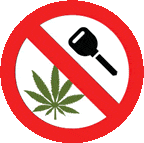
Driving impaired by Cannabis is illegal and carries the same penalties as driving drunk
Testing for impairment due to cannabis use is not as straightforward as testing for impairment due to alcohol or other drugs – a major challenge for employers, police and others. One of the reasons is that the technology for testing at the job site and roadside testing cannot test for “impairment”. The only approved technologies currently available to test for THC in these situations are Dräger’s DrugTest 5000 and Abbott’s SoToxa. Both of these devices use oral fluid to test for the most commonly used drugs, including cannabis. While the oral fluid test for cannabis tightens the window of detection to up to 24 hours, which is consistent with the suggested impairment window, it is possible a person could test positive for THC for a longer period after use if they are a chronic (daily) user or if they are using at very high doses. The variability in individual metabolism, THC strength, and the amount of product that is used or consumed makes it highly difficult to set absolute impairment standards. It is important to note that the technology for cannabis testing lags behind the legislative framework in Canada and this can also be a difficult area for employers. Progress was made in June 2019 when Justice Minister David Lametti signed an order to approve the Abbott SoToxa for use in Canada, nearly a year after approval was given for the first device, the Dräger DrugTest 5000. The rapid adoption of legalization has created a patchwork of standards from different industries across Canada, adding to the challenges. To maintain a healthy and safe workplace, standards will be developed, and challenges resolved through arbitrations and court cases. For example,

“It’s important for Canadians to realize that we don’t have a tool right now, a similar on the alcohol side, a machine that will actually print out something that says ‘you are this, you are that.’ We do not have that.”
Employers should monitor developments and strive to stay ahead of this developing legal area with training that is relevant, as up-to-date as possible and consistent throughout all levels of the organization. In an exclusive interview with The Fifth Estate, Chief Supt. Dennis Daley admitted that, although parts of the current roadside assessments are based on science, the tests themselves will be always be subjective. “It’s important for Canadians to realize that we don’t have a tool right now, a similar on the alcohol side, a machine that will actually print out something that says ‘you are this, you are that.’ We do not have that,” says Daley. “As the science improves, the technology no doubt will follow.”
Cannabis Roadside Saliva Testing Devices Approved by Federal Government of Canada
The saliva-testing devices do not claim to measure the impairment of a driver. Instead, they’re roadside screening devices that indicate whether someone has recently used cannabis. If the test shows recent use, the driver can be taken in for further testing that would form the basis for criminal charges. “An oral fluid sample that tests positive would presumptively confirm the presence of the drug and, combined with other observations made by the police officer, may provide grounds for the investigation to proceed further, either by making a demand for a drug recognition evaluation or for a blood sample,” the approval stated in the Canada Gazette notice. Although the legislation allows for saliva-testing devices to also test for cocaine and methamphetamine, both devices are only approved to test for THC, the psychoactive ingredient in cannabis in Canada.
Dräger DrugTest® 5000
The DrugTest 5000 is an easy to use mobile drug screening system that uses oral fluid to test for seven types of the most commonly abused drugs. This quick drug test provides a non-invasive alternative to the hassle of collecting urine or blood samples.
Global News takes a closer look at the Dräger DrugTest 5000
SoToxa™ Mobile Test System
The SoToxa™ Mobile Test System is designed for rapid drug screening and detection in oral fluid. With test results in minutes, this handheld analyzer is lightweight, compact, and easy to use—convenient for drug screening at the roadside in any type of vehicle.


